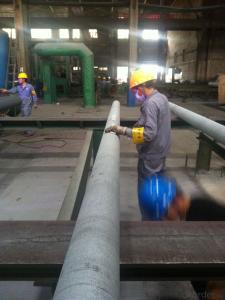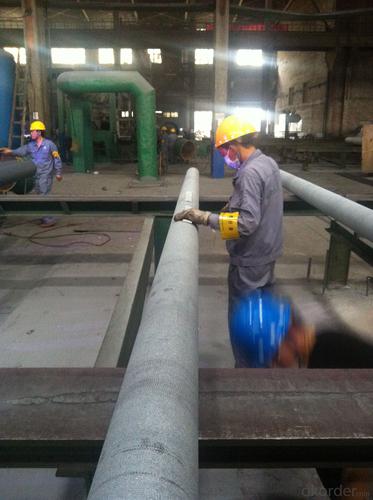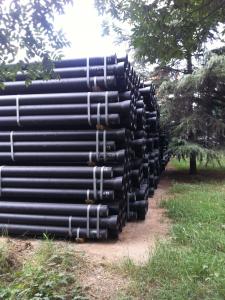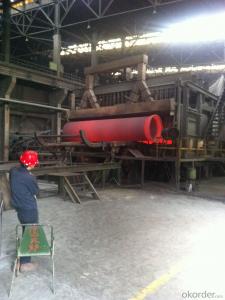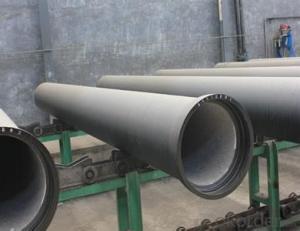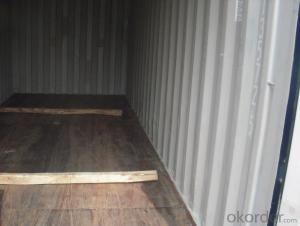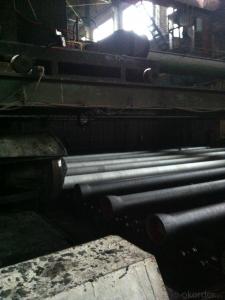DUCTILE IRON PIPE AND PIPE FITTINGS K7 CLASS DN1100
- Loading Port:
- Tianjin
- Payment Terms:
- TT OR LC
- Min Order Qty:
- 23 pc
- Supply Capability:
- 3000 pc/month
OKorder Service Pledge
OKorder Financial Service
You Might Also Like
· Material : Ductile Cast Iron
· Size Range : DN 80mm to DN 2000mm
· Unit Effective Length : 6m or 5.7m
· Manufacture Standard: ISO 2531:1998/ EN 545:2006/EN 598:2007
· Annual capacity : 200,000 tons
· Coating Exterior: Zinc 130g/m2 according to ISO 8179-1 and bitumen coating 70 microns.
· Cement Interior: Portland Cement/ High Alumina Cement/ Sulphate Resisting Cement Lining according to ISO 4179
· Special requirements on external coating and internal lining can be applied
· We also provide accessories such as SBR/EPDM rubber gaskets, lubricant paste, pipe caps, PE sleeves, etc.
Additional Parts:
Each pipe is strictly inspected according to related standard to ensure permanently high performance.
Easy Installation at site and service free for life
Long Service Lifespan
Quotation will arrive you within 24hours once we get your inquiry.
We guarantee offering you a competitive price.
A copy of original inspection reports of pipes will be offered after shipment.
Photos of loading process will be sent to the customer after shipment effect.
We will follow-up the delivery progress after shipment effect and update to the customer on weekly basis.
- Q: What is the expected burst pressure of ductile iron pipes?
- The expected burst pressure of ductile iron pipes can vary depending on various factors such as the pipe diameter, wall thickness, and the specific grade of ductile iron used. However, in general, ductile iron pipes typically have a burst pressure ranging from 350 to 700 psi (pounds per square inch).
- Q: Can ductile iron pipes be used for trench crossings?
- Indeed, trench crossings can utilize ductile iron pipes. Renowned for their remarkable strength and durability, ductile iron pipes prove to be fitting for a diverse array of purposes, including trench crossings. Their capacity to endure substantial burdens and external pressures renders them an optimal selection for subterranean installations. Moreover, ductile iron pipes boast exceptional resistance to corrosion, guaranteeing their enduring and dependable performance in the context of trench crossings.
- Q: Are ductile iron pipes resistant to external loads?
- Generally, external loads pose little challenge to ductile iron pipes. Ductile iron, a variant of cast iron, undergoes treatment with magnesium and cerium additives to enhance its flexibility and durability. As a result, these pipes possess the ability to endure substantial external pressure and stress without succumbing to cracks or fractures. Ductile iron pipes find extensive implementation in scenarios where heavy loads are anticipated, including underground water distribution systems, sewer lines, and industrial pipelines. Their exceptional resistance to external loads has been thoroughly validated, establishing them as a dependable option for diverse infrastructure ventures.
- Q: What is the cost of ductile iron pipes compared to other pipe materials?
- Ductile iron pipes tend to be cost competitive compared to other pipe materials. While the exact cost can vary depending on factors such as pipe diameter and length, ductile iron pipes generally offer a good balance between cost and performance. They are often preferred in applications that require high strength, durability, and corrosion resistance, making them a popular choice in various industries including water and wastewater systems, oil and gas pipelines, and infrastructure projects.
- Q: How does ductile iron pipe resist internal corrosion?
- The resistance of ductile iron pipe to internal corrosion is achieved through a combination of distinct material properties and the use of protective coatings. To start, ductile iron, also known as nodular cast iron, is created by incorporating magnesium into molten iron, resulting in a graphite structure that is nodular or spherical in shape. This unique structure enhances the material's flexibility and elasticity, reducing the likelihood of cracking or fracturing when subjected to stress. Moreover, ductile iron possesses a dense microstructure with a high carbon content, serving as a barrier that prevents corrosive elements from penetrating the surface of the pipe. This inherent resistance to corrosion makes ductile iron pipe suitable for transporting various fluids, including water, sewage, and chemicals, without the risk of deterioration over time. Additionally, ductile iron pipes are often lined with protective coatings internally, further augmenting their resistance to corrosion. These coatings, such as cement mortar or epoxy, form a barrier between the pipe's surface and the fluid it carries, minimizing direct contact and decreasing the likelihood of corrosion. These linings are implemented during the manufacturing process, ensuring consistent and durable protection along the entire length of the pipe. In conclusion, ductile iron pipe successfully resists internal corrosion due to its material composition, including the nodular graphite structure and high carbon content, as well as the application of protective coatings. This combination of factors guarantees the longevity and dependability of ductile iron pipes in various applications, even in environments prone to corrosion.
- Q: Is nodular cast iron pipe filled with Yau Ma Tei?
- Ductile iron pipes are defined as pipes made by casting more than 18 of casting molten iron by adding a spheroidal agent and then centrifugally centrifugally cast by a centrifugal nodular cast iron machineDuctile iron pipe ([span]Ductile Cast Iron Pipes), referred to as ball pipe, ductile iron pipe and ductile iron pipe etc..
- Q: Are ductile iron pipes recyclable?
- Yes, ductile iron pipes are recyclable. Ductile iron is a type of cast iron that has superior strength and durability, making it an excellent choice for various applications, including water and sewage systems. When these pipes reach the end of their lifespan, they can be recycled and reused. The recycling process involves melting down the ductile iron pipes and using the molten metal to produce new pipes or other iron-based products. Recycling ductile iron pipes not only helps to conserve natural resources but also reduces the amount of waste that goes into landfills. Therefore, ductile iron pipes are considered a sustainable and environmentally friendly option for piping systems.
- Q: What kind of valves are commonly used in ductile iron pipes?
- You ask the ductile cast iron valves used on no special, because this interface in connection with the valve on the pipe flange is basically, as long as the flange of the valve should be can be used in milling pipe.
- Q: How much is the manual installation fee of ductile iron pipes from 100 to 150 per metre?
- According to the various connection modes after the installation of artificial fee at =8.7~9.0 yuan (about /M this is pure artificial installation fee, no other costs to calculate, if packet labor costs and construction should be appropriately increased when installed).
- Q: How are ductile iron pipes protected from external damage?
- Ductile iron pipes are protected from external damage through the application of protective coatings. These coatings act as a barrier, shielding the pipes from corrosion and other forms of external damage. Additionally, the pipes may be encased in concrete or installed in a casing pipe to provide further protection against external forces and impacts.
Send your message to us
DUCTILE IRON PIPE AND PIPE FITTINGS K7 CLASS DN1100
- Loading Port:
- Tianjin
- Payment Terms:
- TT OR LC
- Min Order Qty:
- 23 pc
- Supply Capability:
- 3000 pc/month
OKorder Service Pledge
OKorder Financial Service
Similar products
Hot products
Hot Searches
Related keywords
